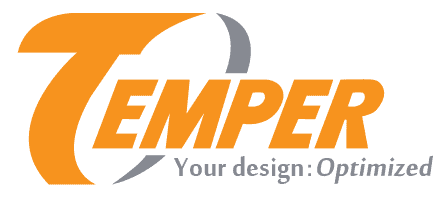Temper Corporation is a leading manufacturer of precision-machined parts and high-temperature metal sealing solutions. In operation for over 50 years, we produce load rings, high temperature metal seals, magnet rings, elevator magnet wheel assemblies, and a variety of custom-designed components. Our parts see broad use across industries such as aerospace, automotive, oil refineries, power generation, mining equipment, and many others.
Joining two components together may require some type of metal seal or metal gasket:
- A metal seal is an engineered solution that provides sealing against leaks and contamination, as well as elasticity to prevent damage caused by operational effects that may impact the two components, such as flange rotation, applied mechanical loads, thermal cycling, and other factors. The seal or gasket will allow the component to spring back into place to maintain the seal.
- A metal gasket covers the space between the metal surfaces of two joining components. Gaskets may also be used to prevent leakage. The metal gasket material is made from a metallic shell with an inner filler. Gaskets grant the ability to maintain a seal under varying levels of compression.
Application of Metal Seals
In many standard applications, seals and O-rings are made from polymer or elastomeric materials. However, when the operating environment will experience radiation, gases that may permeate through plastic materials, high temperatures, high pressures, ultra-high vacuum aspects, or cryogenic temperatures, metal seals and O-rings offer a superior solution. Applications for metal seals include:
- Valves. Leaking valves are a top issue for industrial factories and commercial operations. Most of the leaks occur along the valve stem, flanges, bonnets, or seals. Metal seals are used for valves that experience high temperatures, as the metals used to fabricate these seals are not porous and won't deform. Metal seals can also handle extreme cold temperatures from cryogenic operations where plastic seals would become brittle and fail.
- Aerospace. In aerospace applications, the extreme highs and lows of operating temperature ranges may cause polymer seals to fail. Metal seals are preferred in specific aerospace parts due to their resistance to thermal cycling.
- Nuclear energy. Metal components in nuclear energy facilities experience frequent or continuous exposure to high temperatures and radiation. Metal seals can handle these factors while providing an optimal seal to prevent radiation leaks
- Chemicals. Chemical operations require sealing solutions around pressure pumps, pressure vessels, and valves. Metal seals provide superior performance over elastomers when exposed to high temperatures. They also provide better chemical compatibility and corrosion resistance against some chemical types.
Applications of Metal Gaskets
Metal gasket manufacturers may produce metallic gaskets from a specific metal, or a combination of metal types, depending on the properties required for the gasket. Metal gaskets can handle extreme temperatures, chemical exposure, and high pressures, making them ideal for applications such as:
- Food processing. Metal gaskets must be FDA-approved, since they may come in consistent contact with ingredients during manufacturing processes. Food-grade metal gaskets can withstand a wide range of temperatures, chemicals, oils, and acids without promoting bacteria growth.
-
- Petrochemical. Petrochemical operations may have fluids that move at very high pressures and chemicals that could be corrosive to elastomers. Metal gaskets are preferred in many petrochemical transportation and processing systems.
- Pharmaceutical. Pharmaceutical operations rely on metal gaskets, since they may come in contact with medications for human consumption. The metal gaskets must offer good corrosion resistance while resisting microbial growth.
- Water and gas. Water and gas industries may use metal gaskets in extreme temperature and extreme pressure environments. They provide an effective seal while resisting the corrosive nature of water and gases.
Metal Seals vs. Metal Gaskets
While these two terms are often used interchangeably, they aren't quite exactly the same.
- Metal seals encompass a wide category of sealing applications that may include O-ring seals, shaft seals, rotary seals, gaskets, and many others. A metal seal may be used for a gasket application or non-gasket applications. Seals usually take more time to machine to create an optimal seal along the joint and are engineered and designed during the start of the project.
- Metal gaskets are a type of seal—all gaskets are seals, but not all seals are gaskets. They have a typical function of two flat flanges along with gasket material. Gaskets are often standardized, so they don’t need consideration early in the design and engineering process like some other sealing solutions.
What is an E-Seal?
An E-Seal is a semi-static mechanical seal with an E-shaped cross-section. The cross-section has the purpose of maintaining surface contact despite high cavity deflections in both the negative and positive axial directions. Due to its ability to provide this high springback, compression force on the sealing surface will be maintained during thermal cycles . Metal E-seals will most often be found in high temperature applications.
Why E-Seals?
E-Seals offer resiliency in extreme thermal applications. This means that they are able to handle the constant expansion and contraction of the cavity surrounding the seal. This is partly made possible due to the high springback that the E-shaped convolution dictates, along with the elastic limits set by the selected metal.
Multiple convolutions can be engineered for higher springback requirements due to increased movement under normal operation. This springback also protects against damage to mating surfaces. E-seals can be found in application environments with minimal “seating” load, and relatively low-pressure differentials. Under these pressure differentials, the springback becomes more resilient, allowing for higher clamping forces. Most often, an E-seal is best suited for uni-directional pressure applications because of the axial asymmetry of the cross-section.
E-Seals From Temper Corporation
When choosing the proper E- Seal for your operations, take into consideration the type of materials that will interface with the seal, typical operating temperatures, pressure loads, and any corrosive factors. For assistance selecting the best metal seal for your needs or more information about our E-Seal product line, please contact the experts at Temper Corporation today.
